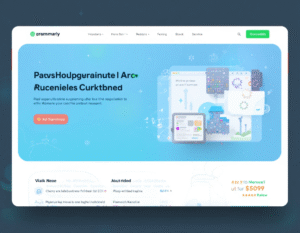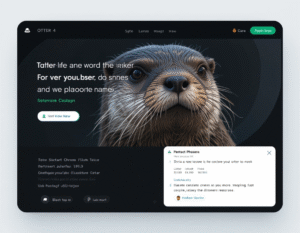In today’s fast-paced educational environment, students need more than just textbooks and lectures to stay ahead. They need smart tools that can make learning easier, faster, and more personalized. That’s where Artificial Intelligence (AI) comes in.
AI tools are transforming education—not by replacing students or teachers, but by enhancing the way we learn, understand, and retain knowledge. Whether you’re in high school, college, or pursuing online courses, there are AI-powered platforms that can supercharge your learning experience.
In this post, we’ll explore the top AI tools every student should know—categorized by purpose and functionality—so you can study smarter, not harder.
1. Grammarly – Your AI Writing Assistant
Best for: Writing improvement, grammar correction, clarity

What it does:
Grammarly uses advanced AI algorithms to check your grammar, spelling, punctuation, and tone in real time. It helps you write essays, reports, emails, or even social media posts with confidence. It also explains your errors and provides learning insights.
Key features:
- Grammar and punctuation correction
- Vocabulary enhancement suggestions
- Tone detection
- Plagiarism checker (premium)
Why it matters:
Grammarly improves writing quality and helps students develop better writing skills over time.
2. ChatGPT – Your On-Demand Study Partner
Best for: Research, explanations, coding help, brainstorming
What it does:
ChatGPT, powered by OpenAI, is a conversational AI that can explain difficult topics, generate essays, solve coding problems, brainstorm ideas, summarize articles, and even create quizzes.
Key features:
- Conversational Q&A
- Text generation and rewriting
- Summarizing and explaining
- Creative writing help
Why it matters:
Whether you’re stuck on a math problem or need help brainstorming a story, ChatGPT acts like a 24/7 study buddy.
3. Notion AI – Smart Note-Taking and Organization
Best for: Note-taking, project management, productivity
What it does:
Notion is a powerful workspace tool, and with AI integration, it becomes even smarter. You can ask it to summarize your notes, generate task lists, create study guides, or even write content drafts.
Key features:
- AI-powered summaries and rewrites
- Knowledge organization with pages and databases
- Task planning and calendar integration
- Study hub customization
Why it matters:
Organized notes and smart summaries help you study more efficiently and keep track of everything.
4. Otter.ai – AI for Lecture Transcription
Best for: Capturing and transcribing lectures or study sessions

What it does:
Otter.ai records your lectures or meetings and converts them into accurate, searchable transcriptions using AI.
Key features:
- Real-time transcription
- Speaker identification
- Shareable transcripts
- Highlight and search features
Why it matters:
Never worry about missing a lecture again. You can focus on listening while Otter does the writing for you.
5. Quizlet – AI-Powered Flashcards and Practice
Best for: Memorization, self-testing, active recall
What it does:
Quizlet uses AI to help you create flashcards and practice quizzes. Its “Learn” mode adapts to how well you know each concept, focusing more on what you struggle with.
Key features:
- Smart flashcard generation
- Adaptive learning system
- Practice tests and games
- Study progress tracking
Why it matters:
AI makes studying more fun and effective through personalization and repetition.
6. Socratic by Google – Homework Helper
Best for: Solving problems, visual learning, mobile studying
What it does:
Socratic lets you take a photo of a homework question (math, science, history, etc.), and it uses AI to scan and explain it with relevant resources like videos and definitions.
Key features:
- Visual explanations
- AI-backed topic breakdowns
- Simple mobile interface
- Linked to Google search and YouTube
Why it matters:
Socratic is like carrying a tutor in your pocket. Great for fast, on-the-go help.
7. Speechify – Listen to Your Study Material
Best for: Audio learners, multitasking, accessibility
What it does:
Speechify converts any written content (articles, PDFs, books) into high-quality audio using AI voice technology. You can listen to your study material while exercising, commuting, or relaxing.
Key features:
- Natural-sounding AI voices
- Adjustable playback speed
- Supports multiple languages
- Sync across devices
Why it matters:
Great for auditory learners or students with dyslexia and attention issues.
8. Elicit – AI for Research and Literature Review
Best for: Academic research, essay writing, critical reading
What it does:
Elicit uses AI to search and summarize academic papers for you. Simply ask a question, and Elicit finds relevant research, summarizes key points, and even identifies gaps in the literature.
Key features:
- Semantic search of research databases
- AI-generated summaries of papers
- Citation suggestions
- Research gap identification
Why it matters:
Cuts research time in half and helps students understand complex academic texts.
9. Photomath – Your AI Math Solver
Best for: Solving math problems step-by-step
What it does:
Photomath lets you scan math problems with your phone camera. It uses AI to instantly solve them and explain the steps clearly.
Key features:
- Instant math problem-solving
- Detailed step-by-step explanations
- Graphing calculator
- Covers arithmetic to calculus
Why it matters:
It doesn’t just give answers—it teaches you how to solve the problem on your own.
10. Perplexity AI – AI-Powered Research Assistant
Best for: Smart search, fact-checking, exploring new topics

What it does:
Perplexity AI is a research-focused chatbot that answers your questions using real-time web sources. Unlike traditional search engines, it provides concise, referenced answers.
Key features:
- Cited answers from the web
- Follow-up question suggestions
- Multi-step question handling
- Great for current events and tech topics
Why it matters:
Perfect for quick, reliable research on almost any subject.
Bonus Tools Students Should Explore
Here are a few more honorable mentions:
- Wolfram Alpha: For solving complex mathematical, scientific, and logical queries.
- Tome AI: AI presentation creator for classroom assignments and project decks.
- Khanmigo (by Khan Academy): AI tutor built on GPT technology to help with lessons.
- Canva Magic Write: AI design and content assistant for creating academic posters or reports.
- You.com: Privacy-focused AI search engine with research and writing tools.
How to Choose the Right AI Tool for You
With so many tools out there, it’s important to pick ones that match your learning style and goals. Here are some quick tips:
| Need | Recommended Tool |
|---|---|
| Writing essays | Grammarly, ChatGPT |
| Math problem-solving | Photomath, Wolfram Alpha |
| Flashcards & quizzes | Quizlet |
| Research | Elicit, Perplexity AI |
| Organizing notes & projects | Notion AI |
| Audio learning | Speechify, Otter.ai |
| Visual learning | Socratic |
| Studying on the go | ChatGPT (mobile), Socratic |
Responsible Use of AI in Education
While AI tools are helpful, they should support—not replace—your learning. Avoid using AI to cheat or bypass the learning process. Instead, use it to:
- Understand difficult concepts
- Organize your study sessions
- Improve your writing
- Accelerate your research
Also, be cautious about privacy. Stick to trusted platforms and be mindful of the data you share.
Final Thoughts: Your Smart Learning Toolkit
AI is not a threat to students—it’s a powerful ally. The right tools can make your learning journey smoother, more efficient, and even more enjoyable. From writing and researching to organizing and solving problems, there’s an AI tool for nearly every academic challenge.
As a student, embracing AI means working smarter, staying competitive, and gaining skills that are already essential in the modern world.
Call to Action:
Which of these AI tools have you used or are excited to try? Let us know in the comments. For more educational tech insights, follow our blog and stay tuned for the next post in our AI learning series.


